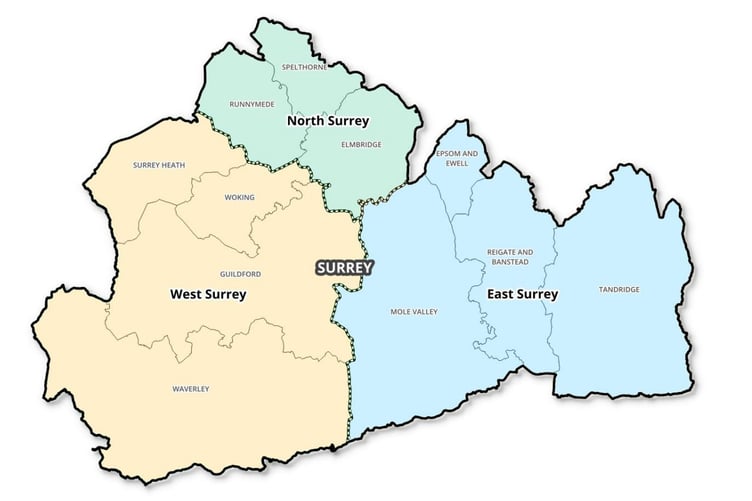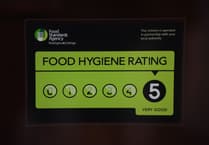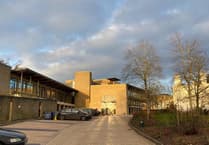Final devolution and merger plans that promise to be one of the biggest political shake ups in Surrey will be formally put forward this week ahead of the Government’s May 9 deadline.
While the county council and a few boroughs and districts, notably Elmbridge, favour splitting Surrey in two – arguing it delivers the best combination of cost savings and devolved powers – the majority are set to back reorganising into three unitary authorities.
The three-council plan would put Waverley, Woking, Guildford and Surrey Heath into West Surrey. Epsom & Ewell, Mole Valley, Reigate & Banstead and Tandridge would me merged into East Surrey, while Elmbridge, Runnymede and Spelthorne would become North Surrey.
Sitting atop all three would be a directly elected mayor.
Those in favour of three councils argue it ”delivers the best outcome for the people and businesses of Surrey” by looking beyond what saves the most money to focus on natural geographic divisions within the county.
Papers presented to councils this week said: “These new councils, East Surrey, West Surrey and North Surrey, are more than just lines on a map.
“They reflect the county’s real economic and human geography. They reflect the lived reality of our residents, and the practical considerations of our businesses.”
It added: “When we examined the evidence, we found that two unitary authorities would be remote from the communities they serve, disconnected from residents and partners, reactive in service delivery, and reliant on outdated means of engagement to overcome a significant democratic deficit.”
But the impact is greater than just identity.
“There are no two unitary options for Surrey that would not divide and fragment the county’s recognised three functional economic areas, baking in strategic inconsistency and economic incoherence from the start, and so significantly hindering economic growth,” the report said.
Councils will begin voting on their formal plans to create new authorities this week with Elmbridge, Spelthorne, Epsom and Ewell, Waverley, Surrey Heath, Mole Valley, and Tandridge all set to vote through their final submissions to the Government on Tuesday night (May 6).
They will be followed by Surrey County Council, Guildford Borough Council, Reigate and Banstead, and Runnymede on Wednesday while Woking will wait until Thursday, May 8.
Any proposed reorganisation is still extremely reliant of Government assistance in dealing with the £5.5 billion of debt Surrey’s councils have amassed.
“To be clear, the decision between two or three unitary authorities is far more than one of mere administrative convenience or numbers on a spreadsheet,” the report said.
“It represents a choice between a system of local government that actively fosters and encourages community empowerment, local decision making and strong place leadership, and one that while certainly aspiring to it, will lack the institutional and strategic clarity to drive growth and embrace truly local decision making.
“A two unitary authority model, lacking alignment with Surrey’s functional economic areas, places and identities will embed economic incoherence and conflicting growth incentives, and cannot meaningfully empower local people due to its democratic distance and disconnection of residents from the levers of power.
“We have considered whether systems like community boards would help, and concluded that, as demonstrated by the experience of Wiltshire, that these will not resolve the fundamental issues,” the report added.
County elections were cancelled this year to give council staff the capacity to focus on devolution. If the process proceeds as planned, elections for the newly formed councils are expected to take place in 2026, followed by a mayoral election in 2027.



.jpeg?width=209&height=140&crop=209:145,smart&quality=75)

Comments
This article has no comments yet. Be the first to leave a comment.